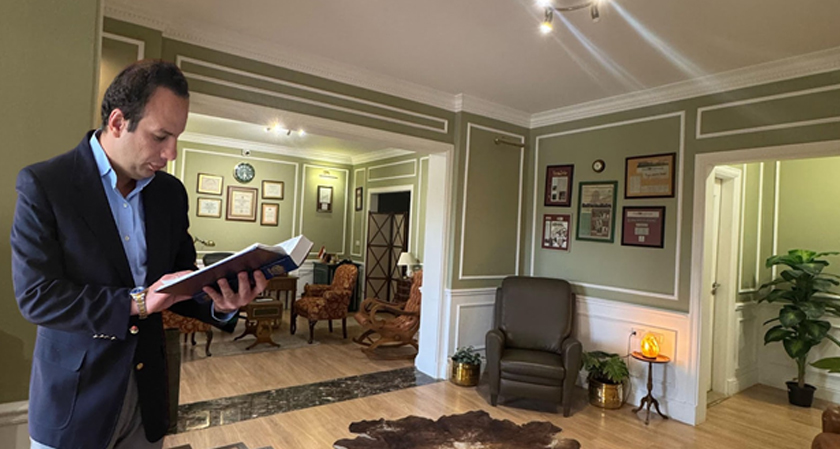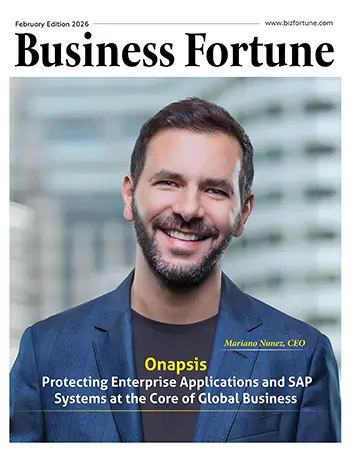Home Industry Retail The Blueprint: Rebuilding Amer...
The Blueprint: Rebuilding America’s Economy One Stitch at a Time
Retail

Business Fortune
13 May, 2025
Ashley Smith
Crossing Oceans, Reshoring Trade and Reducing Foreign Dependence
Orlando, Florida: Minutes before a high-stakes meeting with Egypt’s soon-to-be president around a decade ago, Osama Wahba realized his suit pants, which he had just brought with him from England, were too long. Near downtown Cairo – a city renowned for its textile heritage – he frantically searched for a tailor. To his surprise, not a single professional tailoring shop could make the urgent fix. “I was surprised,” the entrepreneur who had just returned from studying at the University of Cambridge recalls. “In a city with a 3,000-year legacy in textiles, there was no structured tailoring service.” That little emergency sparked an idea—and a business empire.
Nearly a decade later, Osama Wahba, who is widely recognized as one of the country’s top entrepreneurs and the leading figure in the structured tailoring, cobbling, and upholstery industries, enters the U.S. economy with a tested blueprint for impact. He is channeling that moment into rebuilding America’s local service trades. From a small office in Orlando, the Egyptian entrepreneur has launched Disrupt Ventures, a company on a mission to modernize tailoring, shoe repair, and furniture upholstery. His franchise-based model brings tech-enabled efficiency and dignity to these overlooked crafts. “This isn’t just about tailoring,” he says. “It’s about reshaping how traditional trades function in a modern economy—and ensuring they stay local.”
Wahba’s move from regional prominence to U.S. national relevance comes at a pivotal time, as policymakers prioritize reshoring, expanding small businesses, and developing the vocational workforce. His timing is intentional. With over 40% of U.S. apparel imports originating from China, policymakers have emphasized the importance of supply chain independence and job creation, particularly in the fashion sector. Disrupt Ventures answers this call by extending the lives of shoes, furniture, and garments, utilizing locally sourced materials, providing training for underserved workers, and establishing community-based franchises. “Tailoring shouldn’t require imports from overseas,” Wahba argues. “We have the skills and resources right here.”
Each franchise incorporates AI measuring tools, digital scheduling, and sustainability tracking. Apprenticeships feed into the franchise pipeline, offering meaningful careers in trades many had written off. “Osama Wahba exemplifies the best of what immigrant entrepreneurs bring to America,” says Dr. John J. Stucker, a retired professor of American Government and former Assistant to Governor of South Carolina. “Few entrepreneurs so perfectly align with America’s current needs. He revitalizes communities, creates jobs, and fosters innovation.”
A Suit, a Spark, a Startup
A decade ago, Mr. Tailor began as a single shop in Cairo. Wahba followed up with Mr. Cobbler and Mr. Sofa, building a trio of tech-enabled service brands. Today, it spans dozens of locations, more than 10 of them franchised. Each revitalized a fragmented sector, introduced structure, and uplifted thousands of tradespeople.
“He turned tailoring into a scalable system,” says Dr. Mohamed Alaa Abdel-Moneim of Cairo University. “It’s a model that formalizes informal sectors without losing authenticity.”
His companies created hundreds of jobs and trained hundreds of unskilled workers into full-time professionals. Many of his team members now earn more than 1.5 times the local industry average. Hend Rashad, a Member of Parliament in Egypt, adds: “Perhaps what stands out most is his ability to attract institutional investment into an industry that had never been seen as scalable.”
Wahba’s ventures weren’t only successful commercially. They redefined cultural norms around traditional trades, making tailoring and cobbling sources of community pride. “He turned neglected trades into sources of pride,” Rashad notes. Franchises doubled as community hubs, increasing foot traffic and dignity in the profession. The brands became anchors of revitalized retail corridors, boosting neighboring small businesses.
Wahba also used his business growth to empower women and address systemic industry barriers. Every franchise location features at least one trained female tailor or technician to ensure a safe and inclusive service experience. “This policy doubled female customer engagement and improved public trust,” Rashad noted in Parliament. Wahba’s gender inclusion mandate has now become a model for others seeking to combine profitability with equity.
From Policy to Practice

Wahba’s background adds unique depth. A Summa Cum Laude graduate, he also earned an MPhil from the University of Cambridge, where he studied towards his doctorate. He also served as a policy fellow in Egypt. In 2014, he was tapped by Egypt’s president to help shape the country’s Vision 2030 development plan. Wahba contributed to reforms that improved Egypt’s global economic rankings.
“Frankly, I found Mr. Wahba's pivot from government advisory to hands-on entrepreneurship quite bold,” says Dr. Abdel-Moneim. “It proved to me he isn't just an academic thinker.”
Dr. Stucker adds: “He channeled the same passion he had for democratic reform into entrepreneurial innovation, essentially democratizing industries and jobs.” One illustrative moment: when Dr. Stucker visited Wahba in Cairo and accidentally tore his sweater, Mr. Tailor staff restored it using invisible mending – a dying art that Wahba helped revive.
These personal stories highlight a founder who’s equally fluent in national policy and garment threading. Wahba believes both are forms of rebuilding. “Policy is about systemic solutions. Business, done right, can be too,” he says. For Wahba, launching a franchise chain wasn’t a pivot away from reform — it was reform by other means.
His policy training is still evident in how he scales. Business decisions are shaped by governance principles: decentralization, transparency, and accountability. For example, his regional managers participate in ethics workshops, and franchise owners sign service-quality compacts that mirror public sector performance contracts. It’s a hybrid model—half private enterprise, half public-service mindset.
This pivot aligned with emerging academic frameworks on innovation in complex business environments. Scholars Felix J. Brandl and Nina Roider (2023) argue that hybrid models blending agile and traditional project management unlock innovation in traditional manufacturing sectors. Wahba’s franchise framework reflects a similar hybridism—merging age-old trades with digitally enabled oversight, training systems, and customer experience management.
Smart Franchising
Wahba also addressed one of franchising’s core issues: the balance between quality control and franchisee autonomy. Osama Wahba faced this problem during the early growth of Mr. Tailor, when some franchised locations fell short of the brand’s benchmarks, jeopardizing customer trust and operational consistency.
Rather than relying on top-down enforcement, he established a system of open communication, performance-based rewards, and extended contract terms for high performers. This human-centered approach helped solve the “franchise free-riding problem,” slashing attrition to 12% – far below the industry average. “His franchises, thanks to using advanced franchising models, have fostered loyalty, productivity, and long-term growth,” Rashad notes. Franchisees felt a genuine sense of ownership in their work. Structured training and data-driven feedback loops replaced punitive oversight.
By turning franchisees into partners, Wahba avoided the pitfalls of rigid contracts and encouraged long-term success. He says, “We want franchise entrepreneurs, not franchise employees.” This model also reassures franchisees that if they succeed, the parent brand won’t seize back their territory. It fosters both loyalty and entrepreneurship simultaneously.
More than a clever contract, it’s a cultural commitment. Wahba’s offices host “Franchise Town Halls” where owners vote on innovations, pilot programs, and tools. One recent town hall led to the launch of a centralized procurement system to save franchisees 15–20% on material costs—a practical benefit driven by shared governance .” In doing so, he avoids the pitfalls of rigid franchise agreements and offers a model that simultaneously addresses free-riding, encourages performance, and reduces the threat of opportunistic behavior.
Building a Made-in-America Model
With Disrupt Ventures, Wahba brings his experience to U.S. soil. Locations are underway in Florida, Texas, and Pennsylvania. He will form partnerships with technical colleges and is recruiting local apprentices to train in his proven methods. These apprenticeships not only provide technical skills but also reinforce values related to sustainability and professional service.
He’s received interest from local chambers of commerce, investment groups, and sustainability-focused organizations. “He has pioneered new business models in traditional sectors, built institutions that empower others at scale, and led initiatives of national significance,” says Dr. Stucker. “Osama belongs to the select group of individuals who stand at the top of their field.”
Wahba’s vision aligns with U.S. priorities: small business growth, workforce development, and domestic supply resilience. He’s helping restore dignity to the trades while reducing dependency on overseas manufacturing. His businesses divert textile and furniture waste from landfills, extend product life, and train workers in skills that support green economies.
Former Egyptian Ambassador to Washington D.C., Yasser Al-Naggar views his U.S. expansion as a showcase of U.S.-Egypt collaboration in enterprise. Egyptian leaders see it as validation of a model born at home and now exported globally. Wahba, though, remains grounded in mission.
“There’s dignity in these trades,” he says. “And there’s a future for them in the American economy.”


































